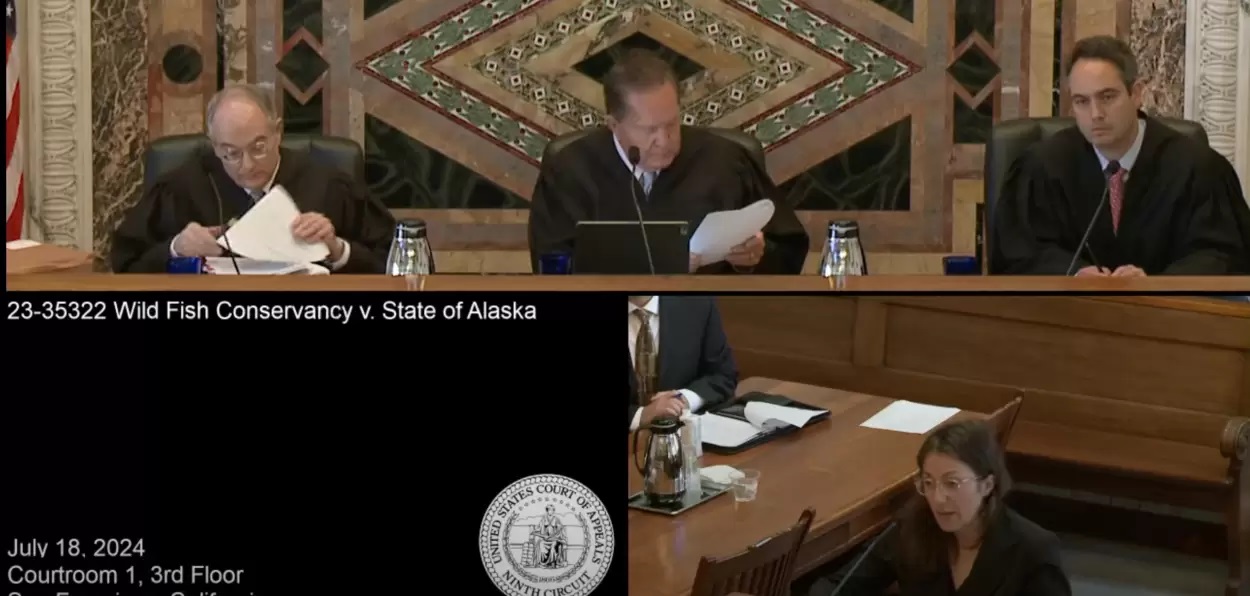
On Thursday, the 9th Circuit Court of Appeals heard cases for and against a lower court ruling that threatened to halt Southeast Alaska’s troll fishery for king or chinook salmon. Although there’s no decision yet, a panel of judges expressed sympathy for the coastal communities that could be hurt by the order.
With an opener the first week of July, Southeast Alaska trollers already got to fish for kings this summer. But the future of their fall season is in the balance at a courtroom over a thousand miles south, in San Francisco, California.
The Alaska Trollers Association, the State of Alaska, the National Oceanic and Atmospheric Administration — or NOAA — and other entities appealed a lower court ruling that found NOAA broke the law by letting Southeast trollers catch too many kings — to the detriment of a population of endangered killer whales.
The Washington District Court order would have effectively stopped Southeast trollers from fishing for kings. But the case is now on hold in the appeals process and in the hands of judges Mark Bennett, Anthony Johnstone, and Milan Smith Jr.
Attorney Laura Wolff, who represents the State of Alaska, argued that keeping Southeast king trollers off the water wouldn’t only injure the region’s economy. She said it could demolish an entire way of life.
“There’s also huge social and cultural harms,” said Wolff. “There are multiple declarations that say, if we can’t fish and earn, if half of our income is lost we’ll probably not fish at all. So it forces people into poverty or choosing to leave these very small rural communities, and that (has) huge cascading effects. It’s not just harm to some fishermen — it’s remote, isolated communities.”
The 9th Circuit Court of Appeals last year issued a stay on a lower court order allowing the fishery to stay open — for now. But the Washington-based Wild Fish Conservancy seeks to lift that stay, and keep Southeast king trollers tied up at the docks.
Their case rests on the idea that the trollers intercept salmon that would otherwise feed Puget Sounds population of endangered Southern Resident killer whales. Attorney Brian Knutsen, who represents the Wild Fish Conservancy, said trollers should think about fishing for something else to keep their economy going.
“If (the opposing counsel’s) position is that: if (trollers) unable to harvest chinook, maybe nobody will fish anything,” said Knutsen. “But half — and even sometimes over half — the economic value of the troll fishery is from coho.”
Knutsen also presented research suggesting the Southern Resident whales, which prefer to eat king salmon, will not recover without immediate and serious intervention.
“The condition is really bad,” said Knutsen. “These whales are continuing to die, and it’s gotten worse during the stay. There’s been no live births since 2023… Sorry — there was one, but the whale died within a month. There’s been multiple late-stage pregnancies that do not produce calves. These whales need prey now.“
But Judge Mark Bennett was skeptical.
“There is a lot of uncertainty around everything here in terms of, is it going to help the whales,” said Bennett. “All we know for sure is that closing some of the fisheries is absolutely going to cause harm to inhabitants of Alaska, and their various subsistence and cultural practices.”
Thekla Hansen-Young is the attorney for NOAA Fisheries. She said that as the appeal moves through the courts, the federal government is rewriting the fisheries rules that were the basis of the Wild Fish Conservancy’s lawsuit. She said NOAA is on track to complete the new version of the rules by November.
And she told the judges she would accept it if they issued more limited instructions — like halting trolling for kings — if NOAA doesn’t finish their rules in time.
With that, the three-judge panel wrapped up the proceedings, with Judge Milan Smith Jr. declaring that he had finally resolved some of his confusion about dolphins and whales.
“I just want to add for the record that (a member of) the audience has informed me that killer whales are dolphins. So there you go,” Smith Jr. said, before tapping the gavel.
The judges may release their opinion on the appeal at any time.
Correction: An earlier version of this story misspelled the surname of attorney Laura Wolff.

إرسال تعليق